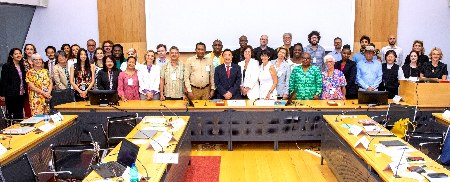Shrinking FAO-CSO Engagement

The Food and Agriculture Organization of the United Nations (FAO) has stated its conviction that hunger and malnutrition can be eradicated in our lifetime, but to meet the Zero Hunger Challenge, political commitment and major alliances with key stakeholders are crucial. FAO further claims that partnerships are at the heart of its mission to help build consensus and collaboration for a world without hunger. The effectiveness and credibility of the Organization as a policy-making forum and unique center of knowledge and technical expertise therefore depend on its ability to work and develop strategic partnerships.
FAO engagement with civic stakeholders has taken a downturn in the period coincident with the arrival of FAO’s new Director General and Regional Director for Near East/North Africa. FAO’s Partnership Office in 2020. In an effort to repair those relationships, FAO headquarters in Rome, held an informal dialogue in June 2023 on the engagement between FAO and over 30 CSOs representatives from several countries to discuss how can FAO better engage CSOs for agrifood-system transformation, toward designing an FAO-CSO forum, and explore ways to foster meaningful engagement at all levels.
The consultation pursued four main objectives, to:
- Take stock on FAO’s engagements with CSOs at various levels, taking into account FAO’s “new approach on transformative partnerships”;
- Collectively brainstorm on the idea of a new engagement mechanism that is sustainable and inclusive;
- Enhance understanding on how to promote strategic engagement between FAO and CSOs through the different collaborations at various levels;
- Co-generate the ideas for a new dialogue mechanism between FAO and CSOs (tentatively called the “FAO-CSO Forum”).
The informal dialogue was discussing and evaluates the Strategy for Partnership with the CSOs that was adopted in April 2013, which recognized CSOs’ critical role; their proximity to, and representation of the food insecure, land dispossessed and hungry; and their broad presence in the field at regional and global levels.
The informal dialogue review the challenges that faced the FAO-CSOs strategic partnership, included the lack of direct communication with FAO officers particularly, at country level, lack of finance resources, disconnect between the strategy and the implementation at decentralized level, ensuring balanced representation of wide range of constituencies, lack of coordination with local actors in crisis and humanitarian responses, and the pandemic impacted negatively the communication with CSOs in FAO process at all levels.
As the International planning Committee for Food Sovereignty (IPC), was part of organizing the dialogue, and coordinated the communications with the CSOs representatives. FAO officers had asked the IPC to present its vision about improving FAO-CSOs engagement, which IPC presented in the following points:
- FAO operates at three spheres: governing bodies, technical committees and programs, and these mechanisms can be informed by the lessons learned/good experience of CSOs and existing stakeholder-engagement mechanisms such as IPC and the Civil Society and Indigenous Peoples Mechanism (CSIPM) which already operate in line with the 2013 FAO guidelines for balance participation and the FAO strategy for partnership with CSOs;
- Priority issues remain eradicating hunger, linking with the SDGs, climate change, and reviewing the ongoing FAO programs;
- The consultation process should respect the principles of the 2013 Guidelines and FAO Strategy, enabling representation of constituencies, time for consultation, language diversity;
- The current on-line consultation could be part of the process, but cannot be the actual consultation.
During the discussion of the context of FAO Strategic Framework 2022–2031, the informal dialogue reviewed several mechanisms of other UN programs to engage CSOs as models to figure in the potential mechanism to engage the CSOs as already in The Food Security and Nutrition (FSN) Forum, included the Global Major Groups and Other Stakeholders (MGOS), the UN Environment Assembly (UNEA), IFAD’s Farmers Forum and Indigenous Forum, UNESCO’s Civil Society Forum and the World Food Programme’s Annual Partnership Consultation.
What can be inferred from this informal dialogue and FAO Strategic Framework 2022–2031, following the 2021 evaluation of the FAO Strategy for Partnerships, is FAO leadership’s preconceived decision to create a new structure that limits engagement to participation in advocacy process within the FSN Forum, but not reflecting the full meaning of strategic partnership in the governing bodies of FAO.
That narrowing of stakeholder engagement was reflected in the FAO General Director QU Dongyu speech during the last session of the informal dialogue, about the importance role of CSOs as a unique and strategic presence in the field urged CSOs to help FAO speed up its own evolution into a modern, more efficient and effective organization. However, he was referring to the technical aspects only, without consideration for the human rights approach to public policies. Reflecting his fractured view of the UN System, he insisted that human rights issues should be discussed before human rights mechanisms in Geneva, and development policies should be discussed within the High-level Political Forum (HLPF) process for SDGs in New York City.
Photo: FAO Director General enjoys a photo opportunity with civil society representatives on 4 June 2023. Source: FAO.
|